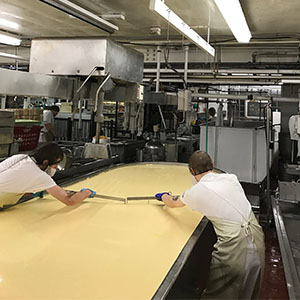You need to turn the history books back more than 80 years to find the humble beginnings of Widmer’s Cheese Cellars of Wisconsin, the Theresa, WI-based cheese company that started when John O. Widmer moved from Switzerland to the United States.
It wasn’t by chance that Widmer settled in a small hamlet known for cheese production, and he followed in the footsteps of many Swiss immigrants in the state to enter the cheese business.
“He was known for caring about the quality of his cheeses, and he built a strong company,” says Joe Widmer, the grandson of John, who serves as owner and head cheesemaster of the company today.

Joe got involved in the business as far back as when he was just a youngster in kindergarten. Back then, he lived above the cheese shop with his six siblings, would help out before school and was excited to rush home and see the finished cheeses that his father had created.
“My father was always committed to being the best that he could be, and that’s what I have always tried to follow,” he says. “The way I see it, it’s like comparing Grandma’s donuts to Dunkin’ Donuts. I’ll take Grandma’s every time.”
Although he took some time away from the cheese business after high school to pursue a dream of being a rock n’ roll drummer, the calling was too much; he returned home and was happy to be back amongst his family.
Joe is a third-generation cheesemaker, having inherited the business in 1992 from his father and uncles (John, Ralph and Jim). Today, he works alongside his son, Joey, who is also now enshrined in the family business.
About a decade ago, Joe earned his certification as a Wisconsin Master Cheesemaker for Brick, Colby and Cheddar, continuing the family commitment to offer the best cheese around.
The Brick Formula
Widmer’s Cheese Cellars is known best for its revered Wisconsin Brick cheese, which is referred to amongst many cheese experts in the state as “a cheese of unsurpassed distinction.”
“The Brick is hand-crafted in small batches to ensure top quality, and its earthy, sweet flavor and sliceability make it a favorite among many, as it is easy to use as a table cheese or as an ingredient,” Widmer says. “Particularly the surface-ripened, foil-wrapped version of this cheese has always been our calling card. Because it’s a washed-rind type that’s aged longer, it develops robust flavors.”
He explains the manufacturing method isn’t too different than other cheeses, but Widmer’s Cheese Cellars has perfected the formula into something special. First, fresh, sweet milk is delivered from nearby farms and brought to the cheese factory via bulk truck, where it is first heated to 162 degrees F and them cooled down to 90 degrees, before it is pumped into stainless steel vats.

Next, they add a starter culture of lactic acid bacteria to the milk, which is mixed to distribute the bacteria. Within a half hour, rennet, a substance obtained from the lining of a calf’s stomach, is placed inside, acting as a curdling agent. The fluid milk can then set for 30 minutes, which coagulates into a soft, semi-solid curd.
“From there, two large wire knives cut the curd into quarter-inch cubes, and the paddles stir the cubed curd and whey,” Widmer says. “They are cooked for nearly 40 minutes to develop the proper degree of firmness and acidity. The whey is gradually drained from the vat, and the curds are then put into stainless steel hoops on drainage tables.”
Finally, covers are placed in the hoops and a brick on top offers enough weight to press the cheese curds into 3-pound brick pieces. They are turned three times a day and then placed in a brine, where they sit for 12 hours.
Once removed from the brine, the bricks go into a 70-degree room for about a week, where they are washed and turned twice. The cheese is then put into 40-degree cold-storage rooms and is ready to be sold in about 14 days.
“Real Brick should have a heady aroma, and the flavor intensifies greatly as it ages,” he says. “It’s not for the timid, but cheese aficionados swoon over it. We’re seeing demand for it increasing, as consumers seek out more distinctive artisanal cheeses.”
Widmer still utilizes the same open vats in the 12,000-square-foot facility that his grandfather used back in 1922, and regularly manufactures 360,000 pounds a year.
He claims to be the only cheesemaker in the U.S. who still uses real bricks as part of the procedure.
In addition to the Brick cheese, Widmer’s is best known for its Wisconsin-original stirred-curd Colby and its four-year Cheddar, which has gained in prominence in the past 15 years..
“The aged Cheddar is a specialty that’s fast become a signature product for us,” Widmer says. “Things have changed in the cheese industry, and the demographics of today show that people are looking more for Cheddar.”

Making Changes
There’s no shortcuts or easy ways to his cheese making process.
Widmer follows in the traditions of his grandfather and the generation before him by doing everything by hand and working hard to produce great-tasting products.
One key area that Widmer has made some changes from the past concerns marketing, where, with the help of his son, he has turned around the identity of the company.
“When I started, all of the labels we used were different, and there was no identifying the Widmer look,” he says. “I commissioned a design for a new logo and tried to create a more upscale, unified look for all of our products.”
After all, Widmer’s cheeses are known throughout the U.S. as high-quality, hand-crafted cheeses, and it was important to him that the labels reflected that.
His strategy was simple: to survive and grow, the company needed a bigger percentage of profit on each pound.
“Our prices also didn’t reflect that, and I raised them to where they should have been given the expertise and labor that goes into crafting our products,” Widmer says. “Supermarkets were beginning to realize that consumers wanted more upscale, specialty cheeses and that this was a growing market with strong potential. Sales did fall off in some of our old accounts, but we began to look at newer, more upscale targets both in foodservice and at retail.”
The 21st Century
Widmer’s Cheese Cellars employs about two dozen workers, many of whom have been with the company for decades. Widmer enjoys the family feel of the job and wouldn’t want it any other way.
“Very little has changed in the 80-plus years that my family has been making cheese here,” he says.
In addition to its three main cheese products, the company’s cheese portfolio has expanded in recent years to consist of flavored variations on Colby and Cheddar as well as convenience products such as shingle-pack Brick and natural Aged Brick Cheese Spread.
Widmer admits he would like the growth and expansion to continue, but he is limited somewhat by the facility he works in.
“Luckily, we’ve been able to grandfather a lot of things through the years, such as our bricks, open vats and brine tanks,” he says. “I have the space to expand, but if I do it, I’d have to do things differently, and I’m concerned that would affect the flavor of the cheese. I don’t know how long I’ll be able to find people to do this kind of labor, so for now, we’ll keep doing things this way and grow as we can.”
It’s par for the course at Widmer’s.



